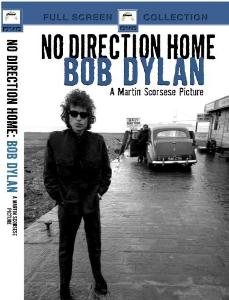Production and content
The film was first broadcast on television in both the United States (as part of the American Masters series on PBS) and the United Kingdom (as part of the Arena series on BBC Two) on September 26–27, 2005. [1] A DVD version of the film and accompanying soundtrack album ( The Bootleg Series Vol. 7: No Direction Home: The Soundtrack ) were released that same month.
The project began to take shape in 1995 when Dylan's manager, Jeff Rosen, began scheduling interviews with Dylan's friends and associates. Among those interviewed were poet Allen Ginsberg and folk musician Dave Van Ronk, both of whom died before the film was completed. Dylan's old girlfriend Suze Rotolo also granted a rare interview, and she later told Rolling Stone that she was very pleased with the project's results. Dylan himself also sat for ten hours in a relaxed and open conversation with Rosen in 2000. Other interviews with those who knew him at the time include Joan Baez, Pete Seeger, Liam Clancy, Maria Muldaur, Peter Yarrow, John Cohen, singer Mavis Staples, artist Bob Neuwirth, guitarist/organist Al Kooper, promoters such as Harold Leventhal [2] and Tom Nelson, record industry A&R reps, promoters and executives Izzy Young, Mitch Miller, John Hammond, Artie Mogul, and filmmaker D. A. Pennebaker.
According to Rolling Stone, an unnamed source close to the project claimed that Dylan had no involvement with the project apart from the interview, saying that "[Dylan] has no interest in this . . . Bob truly does not look back." However, work on the first installment of Dylan's autobiography, Chronicles: Volume One , did overlap production of the project, though it is unclear how much, if any, influence Chronicles may have had on No Direction Home.
Though raw material was being gathered for the project, Rosen needed someone to edit and shape it into a quality motion picture, and celebrated filmmaker Martin Scorsese was approached to direct the documentary planned from the project. Scorsese eventually agreed and came aboard in 2001.
In the meantime, Dylan's offices gathered hundreds of hours of historical film footage dating from the time covered in No Direction Home. These included a scratchy recording of Dylan's high school rock band, his 1965 screen test for Andy Warhol, and newly discovered footage of the famous Manchester Free Trade Hall concert from May 17, 1966, when an angry fan called out "Judas!" just before Dylan and the Hawks performed "Like a Rolling Stone". Shot by D. A. Pennebaker, the onstage color footage was found in 2004 in a pile of water-damaged film recovered from Dylan's vault.
The cover photo on the DVD package, by Barry Feinstein, shows Dylan standing in front of the Aust Ferry terminal in Gloucestershire, England, in May 1966, shortly before the opening of the Severn Bridge which replaced the ferry.
Critical reception
The film received positive reviews from film critics, as review aggregate website Rotten Tomatoes reported that 88% of critics gave the film positive reviews, based on 14 reviews. [3]
Roger Ebert of the Chicago Sun-Times gave the film four out of a possible four stars, stating that it "creates a portrait that is deep, sympathetic, perceptive and yet finally leaves Dylan shrouded in mystery, which is where he properly lives". [2]
In The Guardian , Sam Wollaston wrote: "It's wonderful, a remarkable knitting together of a lot of tangled strands into a thing of sense and beauty. Maybe it will help to convert the unconvinced. Dylanites meanwhile will treasure it, while singing along." [4]
On December 19, 2024, Screen Rant released an article describing the documentary as, "Dylan’s unmatched place in 20th-century American popular music into perspective [that’s] digestible to a newcomer." The article later added that the film "painted a vivid portrait of the artist while still maintaining his mysterious appeal." [5]
This page is based on this
Wikipedia article Text is available under the
CC BY-SA 4.0 license; additional terms may apply.
Images, videos and audio are available under their respective licenses.
